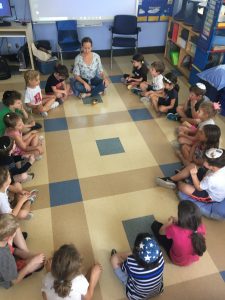Rabbi Grossman
Rosh Hashanah appears to be a holiday about the past and the future. In our thoughts and our prayers, we recall our past sins and misdeeds, and promise to do better next year. And while there is much significance to this looking back and looking forward, we must admit that there is some futility to looking in these directions. While we may regret and repent the deeds of yesterday, in truth there is nothing that we can do to change them. The Machzor, the High Holiday prayer book, reminds us that the past cannot be changed. We must, of course, apologize and seek forgiveness; but what is done is done, and cannot be undone. As for the future, we may promise and resolve to do better, but we cannot guarantee our future deeds, nor know what tomorrow will bring. We are left, therefore, with only the present. We can only be sure of who we are now and how we act in this moment. On Rosh Hashanah we can only transform who we are in the present, and hope to go forward with our transformed selves.
As part of the Akiva Whole Child approach to learning, we incorporate mindfulness into our learning and our curriculum. Our teacher, Lisa Bornstein, is specially trained in mindfulness education, and brings this special form of meditation to our students, training them to be in the moment.The power of the present, the effort to be conscious of who and where we are now, is called mindfulness. While mindfulness has only recently become a popular idea in Western society (brought here from the East), its roots are deep in Jewish thought: Since God is eternal, with no past or future, God is all present. When we focus on the present—on what we are doing now, at this moment—we connect to God, for Whom there is no history or future—only now.
The blowing of the shofar on Rosh Hashanah is meant to startle us out of bustle of our busy routine, from the constant rush of our daily lives, and make us focus, if just for a moment, on the power of the present. One of the mindfulness tools Lisa uses with our students is the Singing Bowl, a type of bell that pierces the moment and helps us focus on the present. The shofar is the Jewish people’s own, ancient singing bowl.
As parents, we are always looking wistfully at our children’s pasts, and worrying about their futures. Of course it is wonderful to think about times past, and we must plan for our children’s tomorrows. But this Rosh Hashanah, let us use the sound of the shofar to make us mindful of the now, of the gifts that our children and our families bring us by being here, with us in the present, in the moment.
My family joins me in wishing the Akiva family a year filled with family, friends, mindfulness, and new memories.






